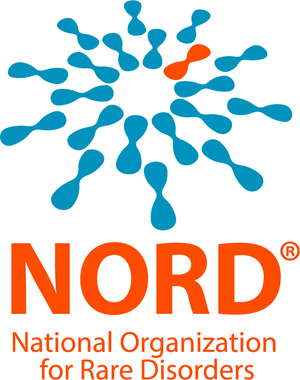WASHINGTON and ALBANY, N.Y., July 6, 2023 /PRNewswire/ -- The Galactosemia Foundation and the National Organization for Rare Disorders (NORD)® today announced they have jointly published the galactosemia community's first "Voice of the Patient" report. This report provides a comprehensive overview of patient and caregiver experiences with this rare metabolic disease, which currently has no approved treatment options.
Insights from this report will be used to help inform the U.S. Food and Drug Administration (FDA) and researchers to aid in the development and assessment of therapies to improve the health and well-being of those with galactosemia.
The report follows a historic Externally Led Patient-Focused Drug Development (EL-PFDD) meeting hosted by the Galactosemia Foundation and NORD last September. It was the first time the galactosemia community, including family members, caregivers, and advocates, came together to share valuable insights with the FDA about the impact of galactosemia on their lives. Nearly 300 attendees shared powerful testimonials on the burdens and complications of galactosemia and their future hopes for treatments and a cure.
"As with many rare diseases, medical professionals have an insufficient understanding of the daily burden of galactosemia as experienced by the patient community and the most meaningful aspects of the disease to prioritize and address. That's why the voice of the patient is so critical," said NORD CEO, Peter L. Saltonstall. "The galactosemia community's dedication to well-informed and passionate advocacy was evident throughout the EL-PFDD, and our newly published Voice of the Patient report highlights the tremendous need for innovation and treatments."
EL-PFDD meetings offer the opportunity for patients and caregivers to provide insights about their experiences with specific diseases directly to the FDA, researchers, medical product developers, and healthcare providers who develop, evaluate, and bring new medications to market. As new drug applications are filed and evaluated, "Voice of the Patient" reports generated following EL-PFDD meetings are a critical resource for the FDA, in addition to mandatory safety and efficacy data.
"Galactosemia can be life-threatening in newborns and causes serious complications throughout every stage of life. Our community is desperate for a treatment option," said Nicole Casale, president of the Galactosemia Foundation. "We are grateful for the opportunity to share directly with the FDA information about the developmental, cognitive, behavioral, and physical complications of the disease and the impact on patients' and families' lives. By speaking out and sharing our experiences, we hope to be part of building a better future for people with galactosemia."
The "Voice of the Patient" report is available for download now, and a recording of the entire EL-PFDD meeting on galactosemia can be viewed here.
About Galactosemia
Galactosemia is a rare genetic metabolic condition in which a child is born without the enzyme which breaks down the simple sugar galactose. Instead of being metabolized normally, the galactose stays and causes toxic byproducts to be released. These agents cause damage to internal organs such as the brain, liver, eyes, and reproductive system. While this disorder affects each person differently, many people encounter cataracts, learning disabilities, speech disorders, neurological/motor impairments, and growth delays. Nearly 100% of infants with galactosemia can be diagnosed in newborn screening programs using a blood sample from the heel stick. Almost all cases of classic galactosemia would be fatal within 10-14 days of life if not diagnosed and treated. The only current treatment is following a galactose-free diet, which restricts adding galactose to the body. It does not, however, combat the galactose that the body creates on its own, which is ten times more than the amount in a galactose-free diet, and causes further damage to the internal organs. This can cause difficult life circumstances as individuals grow into adulthood (i.e., tremors, seizures, inability to live independently, speech issues, infertility, etc.).
About the Galactosemia Foundation
Galactosemia Foundation Inc. is a non-profit charitable organization that advocates for people with galactosemia and their families. Founded in November 1985, Galactosemia Foundation helps provide families information about Galactosemia and facilitates networking between families, clinicians, and researchers. Our mission and objectives include education, support, and advocacy for those affected by Galactosemia. For more information about the Galactosemia Foundation and its board of directors, please visit galactosemia.org, and follow the Galactosemia Foundation on Facebook and LinkedIn.
About the National Organization for Rare Disorders (NORD)
With a 40-year history of advancing care, treatments and policy, the National Organization for Rare Disorders (NORD) is the leading and longest-standing patient advocacy group for the 25-30 million Americans living with a rare disease. NORD, a 501(c)(3) nonprofit, is dedicated to individuals with rare diseases and the organizations that serve them. NORD, along with its more than 300 patient organization members, is committed to the identification, treatment, and cure of rare disorders through programs of education, advocacy, research, and patient services. For more information, please visit rarediseases.org.
Facts on Rare Disease:
- It's estimated that 25 - 30 million Americans have a rare disease.
(Source: https://www.nih.gov/about-nih/what-we-do/nih-turning-discovery-into-health/rare-diseases - Half of individuals with a rare disease are children, and of those one in three will die before their fifth birthday. (https://www.ncbi.nlm.nih.gov/pmc/articles/PMC6185816/
- An accurate diagnosis can take more than four years (Source: https://genomemedicine.biomedcentral.com/articles/10.1186/s13073-022-01026-w
- Patients with rare diseases face medical costs that are three to five times higher than people with non-rare diseases. (Source: https://ncats.nih.gov/files/NCATS_RareDiseasesFactSheet.pdf)
- Patients with rare disease incur nearly half of all hospital costs in the U.S. (Source: https://www.nature.com/articles/s41436-021-01241-7)
SOURCE National Organization for Rare Disorders (NORD)

WANT YOUR COMPANY'S NEWS FEATURED ON PRNEWSWIRE.COM?
Newsrooms &
Influencers
Digital Media
Outlets
Journalists
Opted In





Share this article